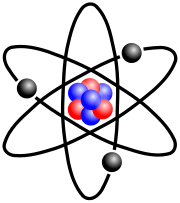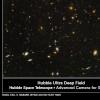How big is the universe?
- Infinite712posted 14 years ago
0
That is, how much matter do you think there is? Do you think that the universe is finite or infinite? Is there never ending "stuff" or a finite amount that's surrounded by absolutely nothing. I don't know what this concept of "nothing" is supposed to be, so I think that an infinite universe makes much more sense.
The universe is finite, but there is more than one universe.
"The universe is finite, but there is more than one universe."
The word 'universe' means "all that exists" or "everything". Obviously there cannot be multiple "everythings". This is an oxymoron. Originally, galaxies were called "island universes". This was also an oxymoron.Universes can exist adjacent to each other. Universes can exist within each other. Perhaps the concept/definition you are thinking of is dimension.
Well, this could just be a petty semantic issue. Maybe what you're calling "the multiverse", is what I'm calling "the infinite universe". But it's misleading to say there are multiple universes because the word universe means "all that exists".
Also "M-theory" seems to have a very abstract version of a multiverse which I definitely disagree with.
As understanding of matter and energy grows so does the size and complexity of the universe. It has gone from being holes in the blanket of the sky allowing celestial lights through to being composed of matter, energy, dark matter and dark energy. What is next? The most boundless thing in the universe may be our curiosity about it and the most limited thing may be our knowledge of what it is and how it works.
Well-said uv!! Favorite forum post of the day, right here.
- Infinite712posted 14 years ago
0
No, but an infinite universe better accounts for cause and effect mechanisms. The motion of a material object is caused by the infinite matter in motion within and without. Both a finite universe and an infinite universe are assumptions, we can never "know" with absolute certainty. But I'd argue that a finite universe is an irrational and "a-mechanical" proposal.
uhmm..are you explaining about your pen name?
I feel bad for laughing.... But darn that's funny.
Infinite, I don't know. The complexities of this question have been studied and debated before by greater minds than me, & they certainly came up short. But I was just asking to see if you had new information to share that had a certain finding.
Let me bow out now of this question. I don't know enough to form a logical opinion on this subject matter.
Too bad Lita Sorenson isn't around anymore. She loved this subject.
If there was finite matter surrounded by idealistic empty space, then eventually matter would 'drift' away from all the other matter. Matter always requires other matter to push against, otherwise there would just be scattered atoms.
I should mention that the universe must also be eternal (matter cannot be created or destroyed). Therefore, if the universe (all matter) was finite then we would not have any complex objects such as stars, galaxies or even rocks. We would just have a bunch of scattered atoms. Actually we wouldn't even have atoms, we'd have particles that constantly disintegrate into smaller particles.
In other words, absolute determinism (cause and effect) requires an infinite universe. An infinite universe is a 'deterministic' or mechanical assumption, whereas a finite universe is an irrational indeterministic assumption.That doesnt really make sense to me. Infinite matter or finite matter has nothing to do with matter drifting nor does it have anything to do with stars forming. I fail to see what you see.
Cause and affect require one object and an action. It does not need to be infinite.
Once again I fail to understand why there needs to be an an infinite amount of atoms to cause them not to be scattered. You will have to explain this to me scientifically. I absolutely cannot see what your saying and I am not trying to be flippant. I just dont see it.
I have another question.....What is entropy?Well, this is because mainstream physics has matterless "forces" that can affect matter at a distance and so that's how they reconcile cause and effect with a finite universe. This however is a fallacy known as 'reification'. "force" is a concept, there's no such thing as 'a' force. Only matter can have an effect on other matter via direct mechanistic surface to surface contact. This is because only matter objectively exists.
Entropy means 'disorder'. But "disorder" is always followed by "order". In other words, the parts of matter eternally fall apart/diverge and then combine with other parts to form larger objects, then fall apart again, etc, etc. Eternal recycling.If your speaking of electromagnetics as a matterless force, it is really an interaction of another particle like an electron at a distance. Other interactive forces like weak and strong nuclear forces and gravity which describe attraction are not physically or mathematically proven.
............They are therefore not an abstraction but just an observation.
There is indeed such thing as a force. It is a physical description that has both a static as well as dynamic characteristic. It does a good job describing a matter's interaction in both a mathematical as well a physical realm.
f=ma=================>That has mechanized the world. In fact without a force, there is no change in the rate of movement of an object. Call it bunk if you will but I will leave that there.
There is no surface contact between matter. The void area in an atom makes all parts of the atom far apart........(extremely far apart with respect to their size) They never touch. This too has been observed. Electron microscope, colliders, ect.
Entropy in terms of what I was asking was more directed at heat and the interaction of heat and matter.
But with all this said. I do not see a connection between either a limitless universe of matter or a limited universe of matter. I have not yet tied it to the discussion we have had so far.
As far as concepts such as gravity, and all the other guft topics, that is something yet to be proven. Maybe by string theory or maybe some fat partial differntial equations........who knows.
Have a good evening.Yes, forces are descriptions (not things). But what is needed is a physical(mechanistic) explanation.
F=ma is a mathematical description, this description needs to be explained with a mechanistic theory.
The mainstream claims this, but yes, I would say that that is 'bunk'. Real atoms do not look like the planetary model.
Subatomic particles have never been observed. All we have are vague computer pictures of the 'trails' that they leave behind in the colliders. We don't actually know much about sub-atomic matter.
My views are very similar to Glenn Borchardt. It would take me awhile to explain all this, so I'll link to his website: http://scientificphilosophy.com/My only issue with Glenn Borchardt is that he has an agenda based description of physics. His main thesis is to get religion out of physics.........and at the same time he describes physics philosophically. That to me is his religion whatever it might be.
Mechanics are described in a physical way. f=ma is a physcial description. Bridges, engines, electric motors are all a mechanical manifestation of force and energy.
I beg to differ with you on atoms being observed. We may not be able to see it with the naked eye but the aformentioned devices were able to observe it. You may not buy it. That is okay.....However, you have no basis to convince me. Most quantum mechanics was modled way before there were computers. It is not a computer model. I will leave it there.
So if you take religion out of science (quite frankly I dont see where it is) and then refute it with a philosophy, arent you just creating another religion?
The bottom line is that we don't have a common basis to talk about this. You can call me a person who buys into classical views of physics and that is all right. It wont hurt my feelings. I am also pretty open minded but to this point there is nothing compelling me to even study any further.Okay, I don't see the problem with wanting to get religion out of physics. But anyway, you should pay attention to his arguments for the infinite universe, etc. Not his supposed "agenda".
"Mechanics are described in a physical way. f=ma is a physcial description."
Yes, f=ma is a legitimate description. But this is an artificial mathematical equation. We can't just leave an abstract description all by it's self. The equation needs to be EXPLAINED in a physical manner(without reifying concepts).
"I beg to differ with you on atoms being observed. We may not be able to see it with the naked eye but the aformentioned devices were able to observe it."
Oh, I know that atoms have been observed. I said that SUBATOMIC PARTICLES have not been observed. The scanning microscope pictures of atoms are what convinced me that the mainstream planetary model of the atom is wrong. Try comparing a picture of real atoms with a picture of a fake planetary atom.I think I get where you're coming from, Infinite712.
It is as Feynman observed, that "the reason the ball goes to the back of the wagon is a property called inertia; but nobody knows how or why." That's a rough paraphrase from memory, of course, and I am aware even the precise original intent doesn't perfectly parallel your point - but it's still that fundamental difference between "knowing the name of something and knowing something." We can attribute the motions of the planets and bodies on a large scale to "gravity" and even describe the relationship between the masses of those bodies and their distances from each other and the strength with which they are compelled - but we still cannot say "what causes gravity?"
Of course, I am aware also of the theoretical explanations against which you seem to be arguing, that attribute "non-mechanistic" qualities to subatomic particles.
BTW, what exactly do you mean by "planetary atom?"Exactly, this is a description. The 'push gravity' theory of Lesage is an explanation.
"BTW, what exactly do you mean by "planetary atom?""
Small nucleus of protons and neutrons surrounded by orbiting electrons. Real Atoms don't look like this. Compare:
Fake planetary atom
Real atoms
Some mathematical physicists admit that this model is just an analogy though. In fact all of the particles of the standard model (protons, neutrons, electrons, quarks, etc, etc) are really just 'useful' analogies.Thank you for quoting Feynman. There is a spiritual quality to that great man, a spirituality not lost on people like Hawking. Feynman has inspired a generation of scientific thought that transcends mere mathematics.
"What I am going to tell you about is what we teach our physics students in the third or fourth year of graduate school... It is my task to convince you not to turn away because you don't understand it. You see my physics students don't understand it... That is because I don't understand it. Nobody does."
"Science is the belief in the ignorance of experts."
Richard p. Feynman
I love it when we all talk like we "KNOW" something is so, rather than struggle with the epistemology of the thing. It is far more interesting to ask, why or how do I know rather than say, "I know what is true." I prefer not knowing than "knowing" that which is, as of yet, unknowable.
I think it's finite because it all ends when you die.
I don't understand your comment. Are you claiming that our observation of matter is what causes it to exist? Matter objectively exists independent of observers.
"Are you claiming that our observation of matter is what causes it to exist?"
Yes that is the theory that I am proposing. That nothing exists until you search for it.So you're saying that if no one were to look at the moon, then the moon wouldn't exist?
..kind of... I'm saying that until YOU look at the moon (or talk about it, or search for it, or google it, etc) it doesn't exist AND that once you stop looking for it, it no longer exists.
Then how come (for example) a boulder can fall down a hill and smash into the back of someones head. No one observed the boulder and therefore it shouldn't exist according to this "observation creates reality theory". This clearly demonstrates that material objects exist independent of our observation of them.
well really no one would know for certainty that it did. Like the whole, if a tree falls in a forest, will it make a sound quandrie. What really happened in your scenerio is that someone was struck by something and it wasn't until that person turned around and then figured it was a rock. It's plausable that (in order to fit the theory) that the person saw falling rocks or gravel and perceived that one could fall and bonk him.
And that 'something' would be the rock. What else could it be? I thought the rock shouldn't exist until it's observed, according to you?
What was it before he turned around and magically turned it into a rock? I thought it was nonexistent according to you?
Sounds like a play off Quantum Uncertainty.
Infinite universe, I am not a fan of the finite theory currently held.
Certainly the significant part to each individual ends when we die. So I agree, the universe ends when I die, hope that doesn't bother you people who will be left when I go. One up side, it will be quiet.
If you have never been out of Kansas . For you .It's 82,282 square miles.
rayOnly one universe? Einstein sets up the possibility for multiple universes. It reminds me of Don Ho, "tiny bubbles in the M-Brane, makes too many dimensions, isn't it strange."
"Only one universe?"
Yes, 'Universe' means "everything".
"multiple universes"
Oxymoron.
"tiny bubbles in the M-Brane, makes too many dimensions, isn't it strange."
Yes, that is "strange". It's also gibberish.Apparently the vast and infinite universe(s) has(have) no room for any notion of humor or absurdity. There is an inherent absurdity in a finite being seeking to apprehend the infinite. Where does the conceit originate that empowers someone other than Einstein or God to dictate to all the nature of the universe/multiverse? By the way, the bubble universe tickles my nose.
http://www.cellularuniverse.org/UniverseModels.htm
I like the idea Krishna keeps the Universe going by churning a sea of milk from the back of a turtle. As long as he keeps on churning, we should be O.K. If he stops, we would all fly off into space...
But if we have enough strawberries, sugar and ice it would be so much better if he traded his turtle for a killer whale.
Estimate is 10^53 kilograms( about 10^50 tons); however, I do not think that est. includes dark energy or dark matter, or the vacuum field, rotational energies, etc. I do believe it is finite. Nothing is nothing but space has structure that can be stretched, bent, etc. It has been proven that space--empty space--has structure. Energy has mass; therefore, luminosity of stars and quasars, speed of moving objects(including rotation) will add to mass of universe. Several definitions to entropy but one I refer to often is, "Entropy is the relentless tendency of everything to go from order to disorder." Great questions, Infinite; keep thinking.
This is an estimate of the observable universe.
Well that's good because dark energy, vacuum field and rotational energies are concepts. Concepts don't exist.
This has not been 'proven', nor can ever be proven. Why? Because "empty space" is a concept. Concepts cannot stretch, bend, etc. Only a physical object such as a hammock can bend.
Energy has mass??? Are you sure about that?...
Thanks, it's interesting to see others views on these subjects.Energy has mass?
It can be converted to mass. E = mc^2. But it takes a heck of a lot of energy to form a speck of matter.To be fair, Infinite712..
Concepts cannot be straight either, correct? So, thinking of space as bent or stretched is really not any more abstract than thinking of space as un-bent or un-stretched.
However, this point is irrelevant really to the discussion, and is only useful in a sporting kind of way, isn't it? Just out of curiosity (I know this makes probably the third question I've asked you specifically in a reply, but...) what do you mean when you refer to "space" in the scientific sense? I mean, leaving behind the pragmatic uses such as "what you give to someone who says 'Back off!'" or "the area between a number of TV celebrities' ears (most of the Kardashians, cast of Jersey Shore, etc.)""Concepts cannot be straight either, correct?"
Right, concepts such as space, time, love, justice, etc can be neither curved nor straight.
"what do you mean when you refer to "space""
Basically "spatial extension" or "distance". Try bending "spatial extension". It'll pass right through your fingers!
Space = EveryWHERE
Universe = EveryTHING
How "big" is the universe, tends to mean to me size, not mass, so I'll start there. At current estimates of science, the universe is 13.7 billion years old. I think that means that the farthest objects quasars or galaxies are a little less than 13.7 billion light years away. That's the apparent "radius," but it's really more comparable to "semi-circumference," because there is no "center" to the universe.
The universe seems to be, at current best guess, finite and unbounded. Like the surface of a sphere in 2D space -- you can keep going and going but never reach the edge, but you could end up where you started if you travel in a "straight" line. But that is only "straight" in the sense of staying within the "surface" of the sphere, or the 3D curvature of physical universe space. I suppose one might say that the radius of the universe is measured in the next higher dimension, time, just as the radius of a sphere is measured not in 2D, but 3D.
As far as mass, there are an estimated hundred billion galaxies out there, based on a tiny sampling of "dark sky." If each galaxy averages to about a tenth the size of our own Milky Way galaxy which is moderately large, then there might be roughly 33 sextillion solar masses in stars alone. Then there are nebulae, rogue planets, interstellar medium (which is not empty, BTW), and the so-called "dark matter." Whew!
There is no "outside" of this finite universe, not in the physical sense. Like I said, if you go far enough, you might end up where you started. Space is folded in on itself -- warped by the mass of all those suns and dark matter.
There is the non-time, non-space of the realm of creation, but that edges into the spiritual. Been there, done that. And that is just as cool as cosmology, perhaps even more so."The universe seems to be, at current best guess, finite and unbounded."
'Finite and unbounded' is a contradiction. Sorry, but that is complete gibberish. You only have two choices:
1. Infinite matter in all directions.
2. Finite matter surrounded by endless 'space'.
"Like the surface of a sphere in 2D space"
This is nothing but a mathematical trick. The surface of a Sphere is 3D. All objects are 3D.
"the next higher dimension, time"
Time is not a dimension. Length, width and height are dimensions.
"interstellar medium (which is not empty, BTW)"
Agreed.
"There is no "outside" of this finite universe, not in the physical sense. Like I said, if you go far enough, you might end up where you started. Space is folded in on itself -- warped by the mass of all those suns and dark matter."
Like I said, this is really nothing but gibberish. You have reified the concept 'space' into a pseudo-object which can be 'warped'.
Related Discussions
- 33
Evaluate: The universe must be finite, because if it were infinite...
by Eric Newland 13 years ago
...there would be no gravity.My reasoning comes from the Shell Theorem:http://en.wikipedia.org/wiki/Shell_theoremSimply put, a spherical shell exerts no net gravitational force on objects inside it. Likewise, there will be no net gravitational force on a point at the very center of a solid...
- 55
Has the Universe been around forever? No, therefore there is a God
by chasemillis 13 years ago
Matter cannot be created or destroyed. Ok that's easy.So that means that the Universe has been around forever. That would be great, except there are no real world examples of infinity. If infinity is not a quality of anything in the Universe, how can it be a quality of the Universe? It doesn't...
- 5
The size of the universe
by Rafick 14 years ago
Is the size of the universe finite or infinite? Scientists tell us the universe is expanding.If the size of the universe at any moment is finite, into what does it expand? Does that "nothingness" into which it expands form part of the universe too, or is it something exterior to the...
- 22
Is the Kalam Cosmological Argument Invalid?
by Sooner28 13 years ago
The argument usually goes:1. All that begins to exist has a cause.2. The universe began to exist.3. Therefore, the universe has a cause.4. If the universe has a cause, it must be timeless and spaceless.5. God fits that description most effectively.6. Therefore,...
- 3
Is the Universe finite?
by pradeep_uoc 16 years ago
Is the Universe finite?If yes, then what is there beyond the universe? If no, then infinity is not just a theoretical concept. There are objects which are infinite in size!!
- 472
How do you know God exists ....?
by Thom Carnes 16 years ago
A few weeks ago I asked what I thought was quite a serious, searching question about the existence of God, and was rather disappointed when it got a very limited response. (This could have been because we were all wrestling this other equally important issues at the time.)Peter Lopez made a valiant...


















